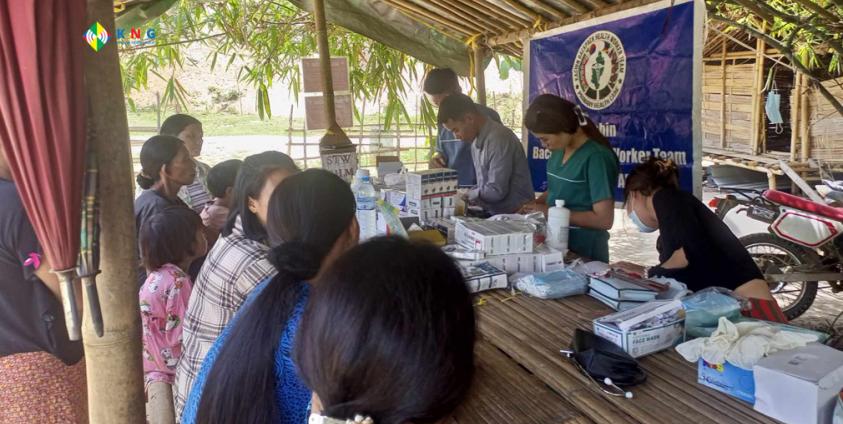Kachin Backpack, a dedicated team of mobile healthcare workers providing medical assistance to residents in remote mountain areas, is currently grappling with a chronic shortage of medicine.
Mr. Zet, an official in charge of Kachin Backpack, said that during the current period of seasonal transition into the rainy season, there is a surge in illnesses. and an increased demand for healthcare in rural areas However, the organization is facing major obstacles in effectively addressing this demand, due to the shortage of medicine.
Mr Zet told KNG, "Our medicine stockpile is nearly depleted, and the demand for medication from patients is incredibly high. We have observed other healthcare groups in similar situations suspending their services or downsizing operations. The scarcity of medicine has become a huge obstacle for us. The prices of drugs fluctuate daily, and are steadily increasing. Consequently it is impossible for us to acquire and maintain a sufficient stock of medication in advance”.
Kachin Backpack extends healthcare support to isolated mountain hamlets, which are inaccessible for both the Military Council and the Kachin Independence Organization (KIO). Additionally, they cater to villages along the Danai-Ledo Road, as well as small communities in Putao and Machanbaw.
With the onset of the rainy season, the local population is encountering various health issues, including runny noses, coughs, fevers, malaria and an upsurge in cases of dengue fever. There has also been a rise in the number of patients with chronic diseases, Mr. Zet said.
"The cases of flu and dengue fever are on the rise, and this year's situation is even worse compared to previous years. We are also witnessing an increase in diseases related to the abdomen and skin. Additionally, we are currently facing a severe shortage of malaria drugs. It is disheartening to learn that other organizations are also grappling with similar issues”, he added.
Another worry is the escalating cost of transportation. For example in the past, the transportation of medicine to the Injangyang region by waterway cost approximately 150,000 kyats. However the current cost has surged significantly to around 400,000 kyats.
Despite the significant increase in transportation expenses, the dedicated healthcare workers of Kachin Backpack ventured to Injangyang in June to offer vital medical treatment to the local residents.
"In certain areas, water resources are alarmingly scarce, particularly during the rainy season when the water turns muddy and unclean. Consumption of this contaminated water by locals leads to frequent cases of diarrhea. Presently, the situation in approximately 10 villages can be described as quite urgent. Moreover, migrant gold mining workers at gold mining sites lack access to healthcare support”, Mr. Zet noted.
After the Military Council staged the coup, a large number of healthcare workers who were serving in remote mountain areas of Kachin State joined the Civil Disobedience Movement (CDM), resulting in a significant absence of healthcare staff in these villages. In light of this situation, Kachin Backpack has taken proactive measures to extend its reach to these isolated areas and provide vital healthcare services.
At present, the stock of medicine at Kachin Backpack is critically low, prompting Mr. Zet to appeal to donors for contributions.







